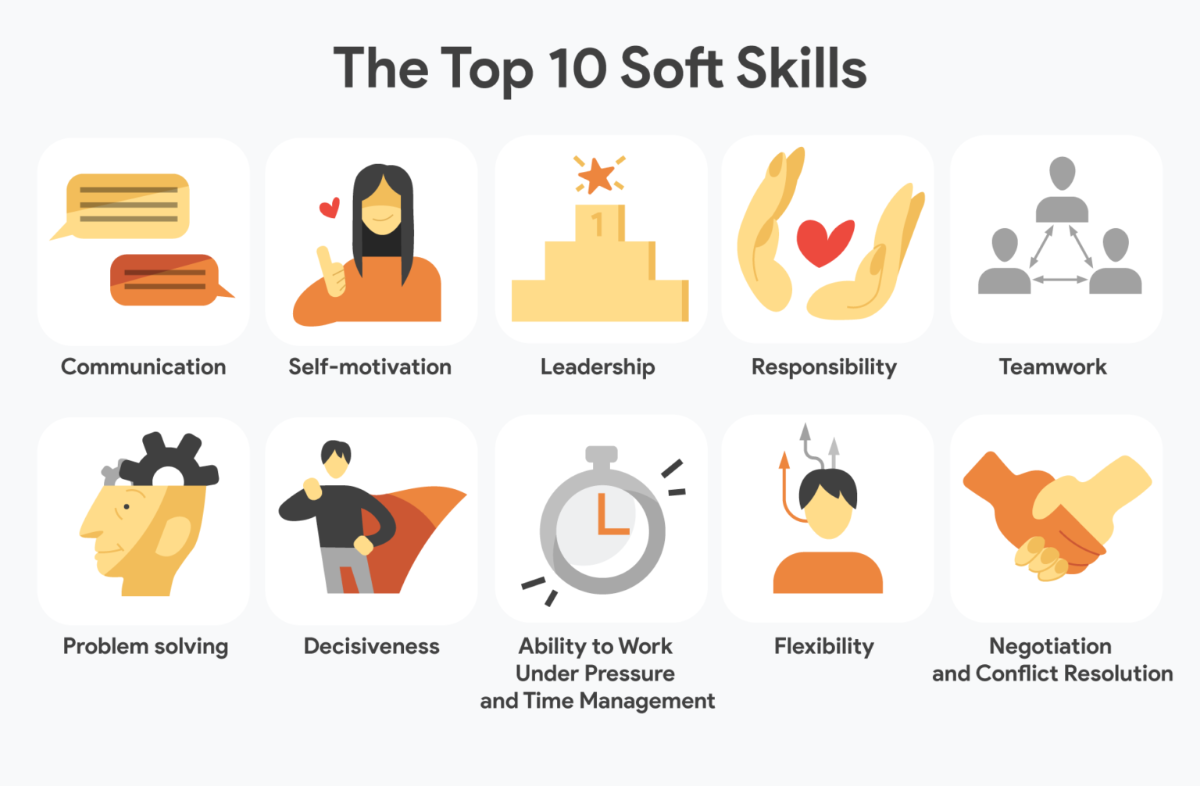
The Importance of Developing Soft Skills
“Developing your soft skills may hold the key to securing intriguing new opportunities.”
Soft skills, which may be used to succeed in any sector, are a blend of interpersonal and communication skills, problem-solving ability, and emotional intelligence.
Whether you want to change careers or advance in your current position, investing time in developing your soft skills can make all the difference in your ability to reach your objectives. You may open the door to newfound possibilities and achievements with the appropriate attitude and commitment.

Source: https://enterrasolutions.com/
What are Soft Skills?
A wide range of competencies, attitudes, and social skills known as “soft skills” are crucial for success in the workplace. They are frequently acquired through experience rather than through formal training or schooling. Employers value soft skills because they enable employees to communicate clearly and collaborate effectively.
Soft skills include qualities such as:
- Communication and interpersonal skills
- Problem-solving and decision-making
- Time management and organization
- Teamwork and collaboration
- Conflict resolution
- Adaptability and flexibility
- Self-motivation and leadership
- Emotional intelligence
Hard skills, which are technical abilities utilized to carry out certain jobs, are distinct from soft skills and abilities. Hard skills typically require formal schooling or training to achieve. Computer programming, accounting, engineering, and medical knowledge are a few examples of hard skills.
The Importance of Soft Skills
In today’s workplace, soft skills are becoming more and more crucial. Soft skills are essential for success in the workplace, consequently employers are increasingly seeking candidates who have them.
Soft skills are vital because they enable workers to collaborate effectively and foster a healthy work atmosphere. Employees are better equipped to cooperate with others and share their ideas when they possess good soft skills. This makes the team more effective and the workplace more productive.
Soft skills are important for career growth as well. Strong soft skills are sought after by employers since they are necessary for leadership positions. Employees with strong soft skills are more likely to get promoted because they will stand out from the crowd.
Different Types of Soft Skills
Interpersonal, communication, and problem-solving skills are the three basic subcategories of soft skills.
The skills that enable people to engage with one another in a constructive and good way are known as interpersonal skills. These abilities include the capacity for inspiring and motivating others, empathy, and active listening.
People can express their ideas and opinions more successfully when they have good communication skills. These abilities include the capacity for effective listening and understanding of others, writing, and public speaking.
People with problem-solving skills are able to find innovative solutions to complex issues. These abilities include the capacity for negotiating, critical thinking, and creative problem-solving.

How to Develop Soft Skills
Developing your soft skills may hold the key to securing intriguing new opportunities. Although they cannot be learned in a classroom, soft skills can be acquired via practical application. The following advice will help you improve your soft skills:
- Take classes or workshops: There are many classes and workshops that can help you develop your soft skills. These classes can help you learn how to interact with others, communicate more effectively, and come up with creative solutions to problems.
- Practice in everyday life: You can practice your soft skills in everyday life. Try to be more assertive when expressing your opinions, practice active listening when interacting with others, and be conscious of your body language.
- Get feedback: Ask for feedback from your peers or colleagues about your soft skills. This can help you identify areas for improvement and make changes to become more effective.
- Get out of your comfort zone: Stepping outside of your comfort zone can help you develop your soft skills. Try doing things that make you uncomfortable, such as networking with strangers, speaking in public, or leading a meeting.
Benefits of Having Strong Soft Skills
Strong soft skills can be advantageous in a variety of ways. The following are some advantages of having great soft skills:
• Improved communication- Having strong soft skills can help you communicate more effectively with others. This can help you build better relationships at work and in your personal life
• Increased productivity– Having strong soft skills can help you work more efficiently and collaborate with others effectively. This can help you get more done in less time.
• Greater success- Having strong soft skills can help you stand out from the competition and make you more attractive to potential employers. This can lead to greater career success.
Soft Skills in the Workplace
Soft skills are crucial in the workplace since they can improve teamwork among employees. Employees are better equipped to work together, convey their ideas, and settle disputes when they possess strong soft skills. A more effective and productive workplace may result from this.
Soft skills can be developed at the workplace in a variety of ways, including by attending workshops and seminars, joining employee resource groups, and taking part in team-building exercises. Employers can also promote the growth of soft skills by giving praise and feedback to staff members who exhibit good soft skills.
Soft Skills in Leadership
For a leader to be successful, soft skills are crucial. Leaders must be able to inspire their team to achieve their objectives and successfully express their vision. They must also possess the capacity to motivate people, settle disputes, and reach difficult decisions.
By participating in workshops and seminars, reading leadership books, and getting input from their team, leaders can hone their soft skills. Additionally, they can support the growth of soft skills in their team by praising and providing feedback to workers who exhibit good soft skills.
Conclusion
Soft skills, which may be used to succeed in any sector, are a blend of interpersonal and communication skills, problem-solving ability, and emotional intelligence. Your ability to achieve your goals may depend on how much time you invest in developing your soft skills. You may open the door to newfound possibility and achievement with the appropriate attitude and commitment.

